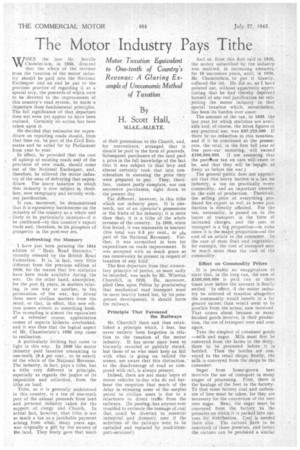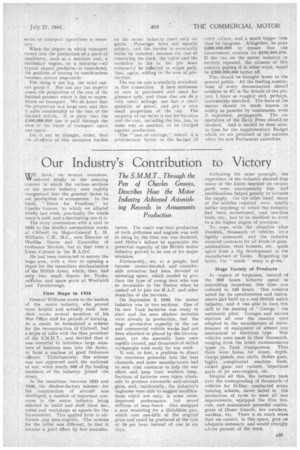The Motor Industry Pays Tithe
Page 24

Page 25

If you've noticed an error in this article please click here to report it so we can fix it.
Motor Taxation Equivalent to One-tenth of Country's Revenue: A Glaring Example of Uneconomic Method • of Taxation
By H. Scott Hall, •
M.I.A.E., M.I.R,T.E.
WHEN the late Mr. Neville Chainbeilain, in 1936, • directed that the whole of the revenue froth the taxation of the motor industry should be paid into the National Exchequer ahd an end be put to the previous practice of regarding it as a special levy, the proceeds of which were to be devoted to the improvement Of this country's road system, he made a departure from fundamental principles. The full significance of that departure does not even yet appear to have been realized. Certainly no action bas been taken_ upon it.
He decided that estimates for expenditure on repairing roads should,. from that time on, be part of the Civil Estimates and be voted for by Parliament from year to year.
In effect, he provided that the cost of upkeep of existing roads and of the provision of new roads, should come out of the National Exchequer, and, therefore, he relieved the motor industrY of the onus of defraying that expenditure. The heavy taxation to which that industry is now subject i5. therefore, now sumptuary and entirely with
out justification. • • It can, moreover, be demonstrated that it is excessively burdensome on the industry of the country as a whole and likely to be particularly inimical—if it be continued—to this country's export trade and, therefore, to its prospects of prosperity in the post-war era.
. Refreshing the Memory I have just been perusing the 1944 edition of " Basic Road Statistics,– recently reissu6d by the British Road Federation. It is, in fact, very little different from the previous edition of 1939, for the reason that few statistics have been made available during the war. On the other hand, absorption, for the past 5i years, in matters relating, in one way or another, to the prosecution of the war, has driven these mere civilian matters from the mind, so that, in effect, this new edition comes almost as something fresh. The re-reading is almost the equivalent of a refresher course: appreciation comes of aspects hitherto overlooked, and it was thus that the logical aspect of Mr. Chamberlain's 1936 step came
• to realization.
A particularly striking fact came to light in this way. In 1939 the motor industry paid taxation amounting to one-tenth (9.4 per cent., to be exact) of the whole of the National Revenue. The industry, in fact, pays a tithe, but a tithe very different in principle, especially as regards the justice of its imposition and collection, from the tithe on land.
Tithe, as it is generally understood in this country, is a tax of one-tenth part of the annual proceeds from land and personal industry taken for the support cif clergy and. Church.. In actual .fact., however, that tithe is not o nendh a Mx as a justifiable payment . arising from what, maey years ago; was originally a gift by the owners of the land. They freely gave that tenth
of their possessions to the Church, and, for convenience, arranged that it should be paid in the form of proceeds. Subsequent purchasers of the land paid a price in the full knowledge of the fact that it was subject to that levy and almost certainly took that into consideration in assessing the price they were prepared to pay. They, therefore, cannot justly complain, nor can successive purchasers, right, down to the present day,
Ear .different, however, is this tithe which our industry pays. It is onetenth, not of an operator's possessions or the fruits of his industry; it is more than that, it is a tithe of the whole revenue of the country. In 1909, when .first levied, it was reasonable in amount (the total was 0.5 per cent., or ulny part of the National Revenue). Further, it was earmarked in tote for expenditure on roads improvement. It was acceptedwith as Much grace as can conceivably be present in respect of. taxation of any kind:
The first departure from that elementary principle of justice, as must sadly be recorded, was made by Mr. Winston Churchill, in 1926. He, moreover, piled OSsa upon Pelion by proclaiming that mechanical road transport must be more heavily taxed lest, by its:prosperous development, it should harm the railways.
Principle That Favoured
the Railways
Mr. Churchill 'there and then established a principle which, I fear, has never entirely been forgotten in relation to the taxation of the motor industry. It has never since been so blatantly revealed or publicly stated, .but those of us who must keep au fait with what is going on behind the scenes, are aware that this distinction,' to the disadvantage of road as compared with rail, is always present.
Indeed, there are not many .tteers of motor vehicles to-day who do not harbour the suspicion that much of the delay in -releasing some of the surplus petrol to civilian users is due to a reluctance to direct traffic from the railways. (In passing,. has anyone ever troubled to estimate the tonnage of coal that. .could be diverted to essential industrial. end ,)omestic uses . if the activities of the railways were to be curtailed and replaced by road-transport .services?) And so, from this first raid in 1926, the money subscribed by the industry was mulcted, in increasing amounts, . for 10 successive years, until, in 1936, Mr. Chamberlain, to Put it bluntly, collared the lot. He did so, as I have pointed out, without apparently appreciating that he had thereby. deprived himself of any real justification for subjecting the motor industry to that special taxation which. nevertheless, has been its burden ever since.
The amount of the tax, in 1939, the last year for which statistics are available and, of course, the latest figures of any practical use, was £87,22.3,000. If there be no reduction in this taxation, and if it be continued at the present rate, the total, in the first full year of free post-war motoring, will exceed £100,000,000. (I am assuming that the purclase tax on cars will cease to be, and that they will be .bqught as freely as before the war.) The general public does not appreciate that this heavy burden is a tax on industry, a tax on practically every commodity, and an important element in the cost of production. • Therefore, the. selling price of everything produced for. export as well as home production is .directly affected. For the tax, necessarily, is passed on to the buyer of transport in the form of increased charges, and the cost of transport is a big proportion—in some cases it is the major proportion—of the cost of an article to the consumer. -In the ease of most fruit and vegetables, for example, the cost of transport may be much more than the cost of the commodity.
Effect on -Commodity Prices It is probably no exaggeration to state that, in the long run, the sum at £100,000,000 is paid two or three times lover before the account iS finale settled. In effect, if the motor industry be relieved of taxation altogether • the community would benefit to a far greater extent than would seem to be possible from the actual , sum involved. That comes about because so many finished goods involve, in their production, the use of transport over and over again.
Take the simplest of consumer goods —milk and sugar. Milk must first be conveyed from the farms to the dairy, there to be processed before it is' bottled. Then the bottles are conveyed to the retail shops; finally, the milk is conveyed from the shops to the consumer.
Sugar. from home-grown beet involves the use of transport in -many stages of processing. First, there is the haulage of the beet to the faettiry. To that same factory coal and carbonate of lime must be taken, for they are necessary for the conversion of the beer, irito sugar. Next, the sugar must be conveyed from the factory to the .premises. on which it is packed into cartons for distribution. Coal is needed there also. The cartons have to be conveyed -be those premiseS, and before the cartons can be produced a similar series of _transport operations. is necessary.
• When the degree to which transport enters into the production of a piece of machinery, 'suchas a machine tool, a stationary engine, or a motorcar—all typical export products—is considered, the problem of tracing its rarnifiCations hecomes, almost impossible.
• The thing is too big, the mind cannot grasp it. -Nor can any but eXperts assess the proportion of the cost of the finished product which is due to expenditure on transport. We do know that the proportion is-a large one, and that it adds considerably to the cost of the finished article. It is plain that the £100,000,000 -taxis paid through the .
nose of the buyer of transport again and again.. .
Let it not be thought,either, that the ill-effects of this excessive burden
on the motor indusiry react only on goods. Passenger fares are equally subject, and the burden is .eventually borne by industry, because the cost of conveying the clerk, the typist and the workman to his or her job must eventual lj'i be reflected in wages paid, thus, again, adding to -the cost of •production.. The tax on cars is sithilarly Ina:adroit inthis connection. A bare minimum ofcars is purchased. and 'used_ 10.1"' pleasure only,. and those that are do a very small mileage, use but a small quantity of petrol, and pay a. Very small proportion of the •tax_ The majority of car miies is run for business and the cots, includihg. the tax,. has, in some way or another, to be charged against production.
The " cost of carriage,". indeed, .is a predominant factor in the budget of every citizen,. and a much bigger itern than he imagines. Altogether,'2'he pays £300,000,000 to ensure that the Government receives its £100,000,-000, If the tax on the motor industry be entirely repealed, the citizens of this country paying it mother ways, would be £200,000,000 better off.
This should be brought home to the general public. All the ttading associations of every denomination should combine to fill in the details of the picture n-iave so roughly and, perhaps, inaccurately sketched. The facts of the matter should. be made kmosvri as widely as possible by continuous, even if expensive, propaganda. The cooperation of the Daily Press should be invoked. And it should be done now, in time for the supplementary Budget which we are promised id the autumn when the new Parliament assembles.




















































